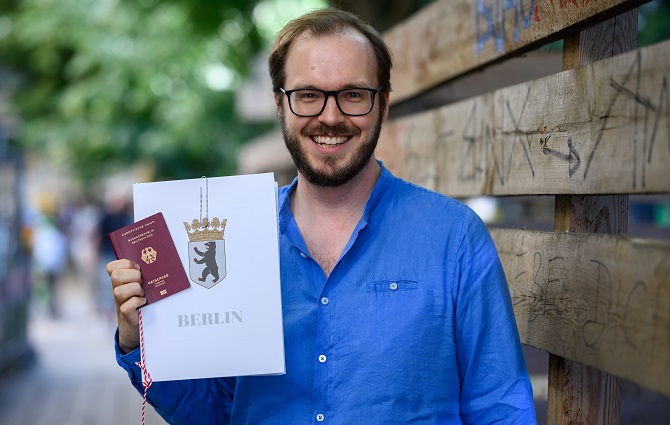Kaliningrad, London, Berlin: A long journey to EU citizenship
Published : 10 Oct 2022, 22:05
Updated : 10 Oct 2022, 22:26
"You and your child Jenny have therefore not acquired German citizenship," reads the letter from the Berlin police, dated September 7, 1942, and stamped with a swastika.
It's a letter that never fails to shock Maxim Edwards. Addressed to his great-grandmother Gertrud, it documents how his grandmother Jenny became stateless because she was Jewish.
The letter was based on a decree that stipulated that citizens of Gdansk, then known under the German name Danzig and annexed by Nazi Germany, would be considered German citizens, except for Jews, Sinti and Roma.
His grandmother Jenny, a minor, fled to Britain while several of her relatives were murdered by the Nazis.
The denial of her citizenship and any documents meant her grandson Edwards struggled to prove his family links to Germany and obtain citizenship.
The 31-year-old was born in London and now works as a journalist for Bellingcat in Berlin, specializing in Eastern Europe. Nonetheless, it was difficult for him to prove that he had a right to become a German citizen, based on his grandmother's experiences.
There are gaps in his Jewish family's history, says Edwards, looking back. Some of his relatives did not survive the Nazi period while others refused to discuss those dark times, preferring to forget the trauma of persecution and flight.
However, his German relatives kept the Berlin police's letter, which proved key in enabling Edwards to become a German citizen.
But the process took a great deal of patience along with a change in the law and a lawyer's assistance.
Edwards, who studied German and Russian, first tried to become German back in 2014. At the time he wrote to the German embassy in London but was told that more documents were needed and that his grandmother had never been German.
He was angry, he recalls, as "many families of survivors of the Shoa have no documents." Despite recurring trips to Berlin, he nonetheless stopped trying to become a citizen for a while.
Then, in 2019, Edwards read about the Article 116 Exclusions Group. The group was founded in London at the end of 2018 and represents the interests of people of predominantly Jewish descent whose applications for re-naturalization have been rejected.
Its members have a broad range of family histories, with many affected by a 1941 decree that deprived German Jews abroad of their citizenship.
There are others, such as Jews of other nationalities who were born in Germany and later fled for their lives, without having a chance to apply for naturalization.
Then there were those like Edwards' great-grandfather, who had roots in areas that were also claimed by Nazi Germany.
Jenny, the mother of Edwards' mother, died before her grandson Maxim was born. She was born in Kaliningrad in 1927 but spent much of her childhood in Berlin.
Her German mother came from Berlin, but at the time, laws prevented women from passing on their citizenship to their children, so Jenny, like her father, became a citizen of the Free City of Danzig, a city-state from 1920 to 1939 that was founded under the provisions of the Treaty of Versailles.
In 1939, Jenny's mother sent her to Britain, fearing for her safety. Her father, a communist from a Jewish family, was already in England, having left several years earlier.
The Nazis likely saw Jenny's mother as a "Mischling," the term used to denote people who were of mixed "Aryan" and non-Aryan descent.
How she managed to survive is one of the family's many unanswered questions.
Edwards applied again to become naturalized in 2020, but this time, the pandemic interfered with his plans.
"Nothing happened," he says.
Then, in 2021, he learned that the law had extended the possibilities for naturalization, which he hoped would increase his chances of becoming German.
Unsure of how to persuade the Berlin administration to take action despite the pandemic, he found a lawyer and threatened to sue for failure to act.
Finally, he was permitted to present his case in February 2022. His parents travelled to Berlin, carrying all the original documents he needed.
He was given his naturalization certificate in May. Berlin city officials handed Edwards his passport, enabling him to remain a member of the European Union despite Brexit, which he had always opposed.
By then, the authorities were friendly and helpful, says Edwards, now a dual national.
That makes him all the more optimistic about his next plan, to have a Stolperstein (stumbling stone) - a brass plate inscribed with the name and life dates of victims of Nazi persecution, thousands of which can now be seen in front of buildings across Germany - laid to commemorate Jenny's grandfather, actor Paul Goldstücker-Goltz, who was murdered in Auschwitz in 1942.


